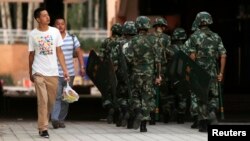Chinese authorities continue to step up their security campaign in an ethnically divided northwest province that last week experienced its deadliest violence in years.
Officials in Xinjiang on Tuesday announced a cash reward of up to $16,000 for information that helps prevent "terrorist attacks" in the province, which is dominated by Muslim Uighurs.
China says last week's violence was carried out by a gang of religious extremists and separatists who attacked a police station and government offices in Lukqun township. Thirty-five people were killed in the riots.
Riots also later broke out in southern Xinjiang's Hotan Prefecture, though there were no reported casualties.
Police have responded with 24-hour patrols, adding to the already tight security that was in place ahead of the sensitive anniversary of a July 5, 2009 outbreak of violence that killed over 200 people.
Beijing blames much of Xinjiang's recent unrest on what it calls Uighur terrorists affiliated with the banned East Turkestan Islamic Movement and trained in foreign countries.
Uighur rights activists deny that their kinsmen engage in terrorism, saying most of the violence in Xinjiang is the result of Han Chinese suppression of Uighur culture and economic opportunities.
Chinese state media on Tuesday said about 100 Uighurs have traveled to Syria in the past year to fight along Syrian rebels. The Global Times quoted Chinese officials who said many have now returned to carry out attacks in Xinjiang.
Some analysts have said that China is exaggerating foreign involvement in the unrest, saying ethnic tensions are to blame.
Officials in Xinjiang on Tuesday announced a cash reward of up to $16,000 for information that helps prevent "terrorist attacks" in the province, which is dominated by Muslim Uighurs.
China says last week's violence was carried out by a gang of religious extremists and separatists who attacked a police station and government offices in Lukqun township. Thirty-five people were killed in the riots.
Riots also later broke out in southern Xinjiang's Hotan Prefecture, though there were no reported casualties.
Police have responded with 24-hour patrols, adding to the already tight security that was in place ahead of the sensitive anniversary of a July 5, 2009 outbreak of violence that killed over 200 people.
Beijing blames much of Xinjiang's recent unrest on what it calls Uighur terrorists affiliated with the banned East Turkestan Islamic Movement and trained in foreign countries.
Uighur rights activists deny that their kinsmen engage in terrorism, saying most of the violence in Xinjiang is the result of Han Chinese suppression of Uighur culture and economic opportunities.
Chinese state media on Tuesday said about 100 Uighurs have traveled to Syria in the past year to fight along Syrian rebels. The Global Times quoted Chinese officials who said many have now returned to carry out attacks in Xinjiang.
Some analysts have said that China is exaggerating foreign involvement in the unrest, saying ethnic tensions are to blame.





